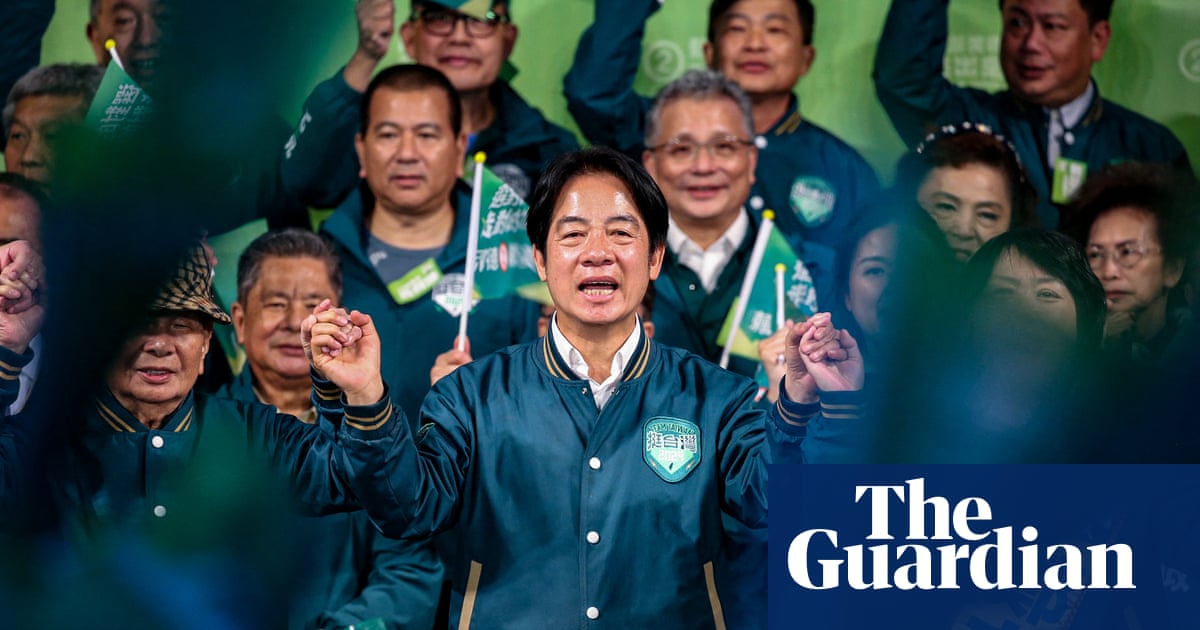
Taiwan has voted for Lai Ching-te to be its next president, ushering in a historic third term in power for the pro-sovereignty Democratic Progressive party (DPP), in a result that will anger Beijing and heighten tensions across the Taiwan strait.
The victory of Lai, who since 2020 had served as vice-president to Tsai Ing-wen, marks the continuation of a government that promoted a sovereign Taiwan and a national identity separate to China, and oversaw some of the deepest cross-strait tensions in decades as Beijing pushed towards its goal of annexation.
Early results showed Lai had won more than 40% of the vote, ahead of Hou You-yi from the opposition Kuomintang (KMT), and a third placed Taiwan People’s party. Pre-election polls had shown Lai with a much narrower lead.
Shortly after being announced as Taiwan’s president-elect, Lai said it was a “victory for the community of democracies” around the world. He said voters had successfully resisted efforts from “external forces” to influence the election, in reference to Beijing’s efforts to have the DPP ousted.
“Taiwanese people have the right to choose their own president,” he said.
However, the DPP lost control of Taiwan’s 113-seat parliament, the legislative yuan. “This means we did not work hard enough, and there are areas we must review and look back on,” Lai said. He pledged to work with the opposition parties and review their policies “as long as they bring benefit to the people”, indicating he anticipated a difficult parliament dominated by two opposition parties.
The entry of a third party candidate into the race had upended traditional voting expectations. Ko Wen-je, a former surgeon and mayor of Taipei City, ran offering a “third way” for voters sick of the two major parties. His detractors said the TPP’s campaign was populist and inconsistent, and light on detail in his plans to deal with China.
Huang Kwei-bo, a professor of diplomacy at National ChengChi University, said: “Lai’s victory results mainly from the split of the main opposition parties that delayed and thus weakened the largest opposition party’s (ie the KMT’s) preparations in campaigns, including ads and policy discourses.”
Lai, who comes from a more radical wing of the DPP, has pledged to follow Tsai’s careful balancing of the US and China, in which she avoided formalising Taiwan’s de facto independence – and antagonising Beijing – by saying Taiwan was already a sovereign nation, and defending the status quo. Beijing claims Taiwan as part of its territory and has vowed to “re-unify” it with China, and has not ruled out the use of force to achieve that aim.
It has called the DPP a party of separatists, detests Lai, and has twice sanctioned his new vice-president, Hsiao Bi-khim, who until recently served as Taiwan’s envoy to the US.
The DPP had presented itself to voters as the party of cautious resistance, avoiding provocation but building defences and strengthening international relationships, particularly with the US and its allies.
The KMT, which also opposes Chinese rule, had accused the DPP of increasing the danger, and said that if it won the election it would seek to restore dialogue and friendly relations with China to reduce tensions.
Lai said China had a responsibility to maintain peace in the region.
Amanda Hsiao, a senior China analyst with the International Crisis Group, said Lai’s win was not necessarily an endorsement of his cross-strait policies.
“I think it reflects more on the inability almost of the KMT to convince voters that they have an approach that has been updated to fit the new geopolitical circumstances, updated since they were last in power,” she told the Guardian.
Hsiao said Beijing was likely to react to Lai’s victory with increased pressure, particularly in the lead-up to his inauguration in May.
“They labelled Lai as a troublemaker, so there is some expectation that they respond,” she said.
“The objectives are to get Lai to characterise the cross-strait relationship in a way that comes as close to what Beijing wants as possible, to adopt a more moderate vibe. Another is to signal to their own domestic audience that things are in control.”
But the acts of pressure were likely to be more discreet than the large-scale military drills seen in recent years, Hsiao added, such as more punitive trade decisions, and military or grey-zone activities such as the recent increase in meteorological balloons flying through Taiwan’s sovereign airspace.
The election was also fought on domestic issues, such as the economy and the DPP’s reputation as the vanguard of progressive values. “I am gay, and the DPP is really supportive of human rights, gay rights, and friendly to LGBTQIA,” said Chou Yutao, a DPP supporter, before the vote. “The most important thing is to respect ourselves as Taiwanese,” he said.
Taiwan is a relatively young democracy, emerging from decades of authoritarian rule in the late 1980s and holding its first entirely free elections in the mid-1990s. The freedoms of voting – in stark and conspicuous contrast to those denied in China – are a point of pride and enthusiasm.
Competing parties travelled Taiwan for weeks, holding large public rallies in cities and towns for thousands of attenders. Voters, including many from Taiwan’s large international diaspora, made the journey back to their home neighbourhoods to vote in person.
Vivi Lin, a 25-year-old student, travelled back from the UK to cast her ballot in Yilan, a city in northern Taiwan. The plane ticket cost about 40,000 new Taiwan dollars (£1,000). “It was just such a miraculous moment. I voted along with my grandma and grandpa. I’m the first generation of a democratic Taiwan. Growing up, my grandparents and parents were always telling me how precious the freedom and democracy we have right now is.”
Lai’s win largely followed what polls had been predicting before the blackout period began 10 days ago, but internally the campaign had grown increasingly worried in recent days..

